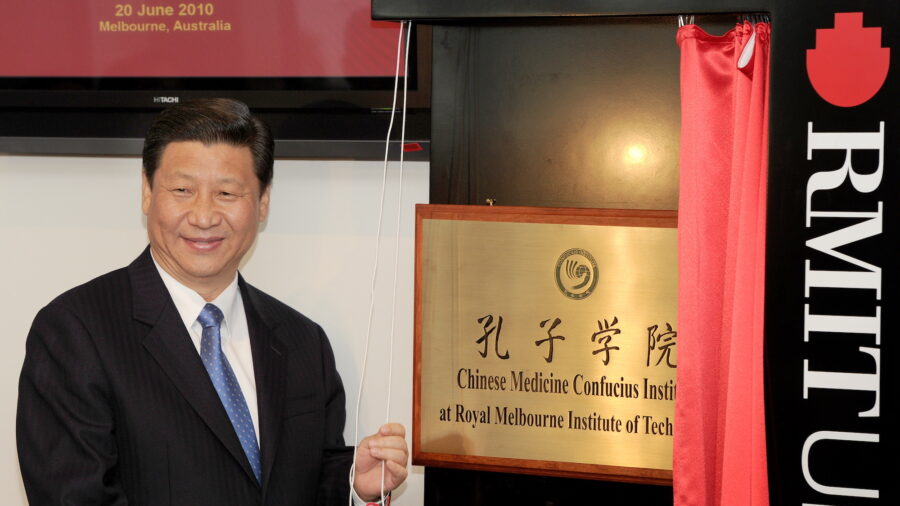The Biden administration has quietly killed a rule proposed by the Trump administration to safeguard U.S. academic freedom from the threat of Beijing-funded Confucius Institutes (CIs).
The proposed rule, named “Establishing Requirement for Student and Exchange Visitor Program Certified Schools to Disclose Agreements with Confucius Institutes and Classrooms,” was submitted by the Trump administration to the Department of Homeland Security (DHS) on Dec. 31 last year.
Under the rule, colleges and K-12 schools that are certified to host foreign exchange programs would need to disclose their financial ties to CIs and the affiliated Confucius Classrooms.
Last month, an unnamed DHS official told Axios that the rule would also apply to “any other cultural institutes or student groups, such as Chinese Students and Scholars Associations, that are funded directly or indirectly by China.”
The proposed rule was withdrawn on Jan. 26, according to the U.S. Office of Information and Regulatory Affairs (OIRA), which is a division of the White House’s budget office.
On Feb. 9, a spokesperson for Immigration and Customs Enforcement (ICE), the law enforcement agency under DHS, confirmed that the rule was withdrawn on Jan. 26, in an emailed response. The spokesperson declined to comment on the reasoning for the rule’s cancellation.
“ICE does not speculate about future pre-decisional proposed rules or policies,” the spokesperson stated.
Under the Trump administration, CI language and culture programs came under scrutiny from U.S. officials over concerns that they spread Chinese propaganda, restrict academic freedom, and facilitate espionage in U.S. classrooms. In August last year, the State Department designated a Washington-based center that promotes CIs in the United States as a foreign mission.
In 2004, the University of Maryland became home to the first CI in the United States. Since then, more than 100 CIs have been established at U.S. schools.
The National Association of Scholars (NAS), an education advocacy group, reported that 55 CIs have closed or are in the processing of closing, as of Jan. 19. Currently, 63 CIs remain open in the United States, including two that are scheduled to close later this year.
There has been a global pushback against CIs, most notably in countries such as Australia, Canada, and the United Kingdom. In 2013, McMaster University in Canada became the first university in North America to close its CI.
The Biden administration’s decision has since been heavily criticized by several Republican lawmakers, including Sen. Marco Rubio (R-Fla.) and Rep. María Elvira Salazar (R-Fla.).
Rep. Michael McCaul (R-Texas), top Republican on the House Foreign Affairs Committee, criticized the Biden administration for failing to consult Congress on the decision.
“By quietly backing away from the proposed rule without consulting Congress, the Biden administration is sending a concerning signal about its scrutiny of CCP [Chinese Communist Party] influence in academia, and telling academic institutions that they don’t need to be transparent about their ties to China’s regime,” said McCaul in a statement.
He added: “I strongly urge the Biden Administration to stick to its promises to prioritize the CCP as our main national security challenge, including in the American education system.”
Rep. John Joyce (R-Pa.) took to Twitter to say that CIs are “a growing threat to both our national security and to the future of American research & innovation,” pointing to a 2020 report on China put together by the China Task Force, a group of Republican House of Representatives concerned about Beijing’s threats.
“Rather than encourage propaganda, the Biden Admin should stand with the American people against the CCP,” he stated.
Elise Stefanik (R-N.Y.) said Biden’s decision was “short-sighted and harmful,” according to a statement from her office.
“This illogical decision helps fuel the propaganda of America’s number one adversary, jeopardizes the integrity of our education system, and puts students on American campuses at risk,” she stated.
There has been a push at the state level to close down local CIs.
Last week, Utah state lawmaker Candice Pierucci introduced a resolution (H.J.R.8) to protect her state’s institutions of higher education from CCP influence.
The resolution calls on colleges and universities in Utah to disclose their CI contracts and close down their CIs. According to the NAS, the University of Utah and Southern Utah University have CIs on their campus.
In July last year, Alabama State Representative Tommy Hanes unveiled a new bill that would ban CIs from Alabama public colleges.
At least one U.S. official has publicly called for American students to learn the Chinese language and history from Taiwan instead of at CIs.
“Learning Mandarin from Taiwanese teachers means learning Mandarin in an environment free from censorship or coercion,” stated William Brent Christensen, the Taipei office director of the American Institute in Taiwan, in an interview with Japanese media Nikkei Asia earlier this month. The institute is the de-facto U.S. embassy in Taiwan.
Aside from withdrawing the proposed CI rule, the Biden administration has undone a number of other Trump administration policies related to China—including rejoining the Paris Climate accord, re-engaging with the United Nations Human Rights Council, and rejoining the World Health Organization.
From The Epoch Times

